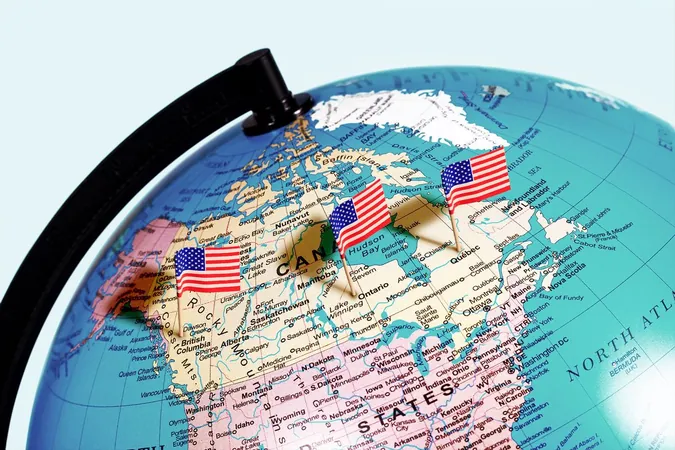
Trump's Imperial Fantasies: Greenland and the Panama Canal — An Unrealistic Vision
2024-12-29
Author: Emma
Once again, Donald Trump has stirred controversy with his outlandish claims and aspirations regarding foreign policy. The president-elect's recent social media posts over the Christmas holiday reignited discussions about the strategic importance of Greenland and the Panama Canal. While his comments were filled with inflammatory rhetoric and unconventional capitalization, they also revealed a convoluted understanding of geopolitical history and the complexities of international relationships.
Trump's whimsical musings about Canada becoming the "51st state" and his playful suggestion that hockey legend Wayne Gretzky should run for Prime Minister were typical of his penchant for trolling, but they overshadowed the more significant implications of his assertions regarding Greenland and Panama. Such claims reflect an undercurrent of archaic imperialism that seems inherent to his political identity. The notion that Canada could ever join the U.S. as another state is more fantasy than feasible, yet it's a sentiment that plays into long-standing U.S.-Canada dynamics, where Canadians often find themselves in a frenemy relationship with their southern neighbor.
Delving deeper into Trump's comments about Greenland and Panama unveils a troubling vision of "American exceptionalism" intertwined with imperial nostalgia. The former U.S. president's suggestion that "the wonderful soldiers of China" are unlawfully operating the Panama Canal is not only inaccurate but represents a gross misunderstanding of historical and geopolitical facts. The idea that the U.S. could simply reassert control over the canal or purchase Greenland from Denmark is emblematic of a willful disconnection from modern realities.
The historical context of these regions reveals a tapestry of colonialism and exploitation that predates modern American politics. The Panama Canal, for instance, was born from U.S. machinations that backed a revolution in Panama, allowing the U.S. to gain control over one of the most crucial maritime passages in the world. The canal has been under Panamanian sovereignty for 25 years now, following a 1977 treaty that saw the gradual transfer of control.
Greenland, with its unique position in the Arctic and intricate political relationship with Denmark, possesses its own complicated heritage. The Inuit people, who make up the vast majority of Greenland’s population today, have a centuries-long history that traces back to their arrival post-Norse settlements. Greenland is now on the path to increased autonomy, having garnered self-governing powers in 2008. The notion that it could simply be purchased by the U.S. is not only far-fetched but also disrespectful to the island's inhabitants and their aspirations for sovereignty.
Trump's fixation on these territories is not merely an idle fancy; it reflects a broader narrative within American conservatism that yearns for the perceived glory of a bygone era. This quasi-imperial mindset seeks to reclaim what history has ostensibly given away, overlooking the atrocities of colonialism and its lasting ramifications. The MAGA ideology plays into this fantasy by suggesting that returning to an imagined past could restore economic stability and social order.
In recent times, conversations around Greenland have become increasingly relevant, particularly due to climate change, which is melting its ice and unveiling untapped natural resources. Investment interest, particularly from China, has grown, presenting a complex layering of contemporary geopolitical stakes that Trump seems to overlook in his jingoistic ideations.
Both Greenland and Panama remind us of the often violent history of U.S. expansionism and the contemporary consequences of those actions. Trump's remarks may be dismissed by many as ludicrous; however, they resonate in a part of American sentiment that clings to a vision of dominance and control over global affairs, despite the evolving nature of international relations in the 21st century.
As the world watches, it's clear that Trump's cavalier attitude towards these discussions reflects not just a misunderstanding of history, but a dangerous impulse to revert to a model of governance that many would argue has no place in today’s interconnected global landscape.



 Brasil (PT)
Brasil (PT)
 Canada (EN)
Canada (EN)
 Chile (ES)
Chile (ES)
 Česko (CS)
Česko (CS)
 대한민국 (KO)
대한민국 (KO)
 España (ES)
España (ES)
 France (FR)
France (FR)
 Hong Kong (EN)
Hong Kong (EN)
 Italia (IT)
Italia (IT)
 日本 (JA)
日本 (JA)
 Magyarország (HU)
Magyarország (HU)
 Norge (NO)
Norge (NO)
 Polska (PL)
Polska (PL)
 Schweiz (DE)
Schweiz (DE)
 Singapore (EN)
Singapore (EN)
 Sverige (SV)
Sverige (SV)
 Suomi (FI)
Suomi (FI)
 Türkiye (TR)
Türkiye (TR)
 الإمارات العربية المتحدة (AR)
الإمارات العربية المتحدة (AR)